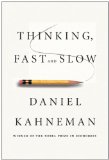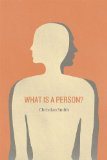October 25, 2011

Thinking, Fast and Slow by Daniel Kahneman (Farrar, Straus and Giroux)
(kindle ed.), (amazon.co.uk – 3 Nov)
Product description from the publisher:
Daniel Kahneman, recipient of the Nobel Prize in Economic Sciences for his seminal work in psychology that challenged the rational model of judgment and decision making, is one of our most important thinkers. His ideas have had a profound and widely regarded impact on many fields—including economics, medicine, and politics—but until now, he has never brought together his many years of research and thinking in one book.
In the highly anticipated Thinking, Fast and Slow, Kahneman takes us on a groundbreaking tour of the mind and explains the two systems that drive the way we think. System 1 is fast, intuitive, and emotional; System 2 is slower, more deliberative, and more logical. Kahneman exposes the extraordinary capabilities—and also the faults and biases—of fast thinking, and reveals the pervasive influence of intuitive impressions on our thoughts and behavior. The impact of loss aversion and overconfidence on corporate strategies, the difficulties of predicting what will make us happy in the future, the challenges of properly framing risks at work and at home, the profound effect of cognitive biases on everything from playing the stock market to planning the next vacation—each of these can be understood only by knowing how the two systems work together to shape our judgments and decisions.
Engaging the reader in a lively conversation about how we think, Kahneman reveals where we can and cannot trust our intuitions and how we can tap into the benefits of slow thinking. He offers practical and enlightening insights into how choices are made in both our business and our personal lives—and how we can use different techniques to guard against the mental glitches that often get us into trouble. Thinking, Fast and Slow will transform the way you think about thinking.
See also: “The Marvels and the Flaws of Intuitive Thinking” at Edge.org
Comments (0)
- cognitive science,mind,new books
October 21, 2011

Talking Heads: The Neuroscience of Language by Gianfranco Denes (Psychology Press, 2011)
(amazon.co.uk)
Product description from the publisher:
The origin, development, and nature of language has been the focus of theoretical debate among philosophers for many centuries. Following the pioneering clinical observations 150 years ago of loss of language following a cerebral lesion, language started to be considered a biological system, that could be investigated scientifically. As a consequence, an increasing number of scientists began to search for its anatomical and functional basis and its links with other such cognitive systems. The relatively recent introduction of neuroimaging tools, such as PET and fMRI, has brought rapid and groundbreaking developments to the field of Neurolinguistics.
In this book, Denes harnesses these advances to adopt a biolinguistic approach to the study of a subject that increasingly sees the collaboration of linguists, experimental psychologists, neuroscientists and clinicians. Talking Heads reviews the latest research to provide a concise analysis of the multifaceted aspects of language which focuses both on theoretical aspects and physical implementation.
Following an up-to-date description of acquired language disorders, and their contribution to the design of a functional architecture of language, the book illustrates the neurological process involved in the production and comprehension of spoken and written language, as well as investigating the neurological and functional systems responsible for sign language production and first and second language acquisition.
With a glossary of the anatomical and linguistic terms, this book provides an invaluable resource to undergraduate and graduate students of psychology, psycholinguistics and linguistics.
See also: Sample chapter (pdf)
Comments (0)
- cognitive science,language,new books
October 20, 2011

The Ethical Project by Philip Kitcher (Harvard University Press, 2011)
(amazon.co.uk – 4 Nov)
Product description from the publisher:
Principles of right and wrong guide the lives of almost all human beings, but we often see them as external to ourselves, outside our own control. In a revolutionary approach to the problems of moral philosophy, Philip Kitcher makes a provocative proposal: Instead of conceiving ethical commands as divine revelations or as the discoveries of brilliant thinkers, we should see our ethical practices as evolving over tens of thousands of years, as members of our species have worked out how to live together and prosper. Elaborating this radical new vision, Kitcher shows how the limited altruistic tendencies of our ancestors enabled a fragile social life, how our forebears learned to regulate their interactions with one another, and how human societies eventually grew into forms of previously unimaginable complexity. The most successful of the many millennia-old experiments in how to live, he contends, survive in our values today.
Drawing on natural science, social science, and philosophy to develop an approach he calls “pragmatic naturalism,” Kitcher reveals the power of an evolving ethics built around a few core principles—including justice and cooperation—but leaving room for a diversity of communities and modes of self-expression. Ethics emerges as a beautifully human phenomenon—permanently unfinished, collectively refined and distorted generation by generation. Our human values, Kitcher shows, can be understood not as a final system but as a project—the ethical project—in which our species has engaged for most of its history, and which has been central to who we are.
See also: “The Page 99 Test”
Comments (0)
- culture,new books
October 19, 2011

Teaching Minds: How Cognitive Science Can Save Our Schools by Roger Schank (Teachers College Press, 2011)
(amazon.co.uk)
Product description from the publisher:
From grade school to graduate school, from the poorest public institutions to the most affluent private ones, our educational system is failing students. In his provocative new book, cognitive scientist and bestselling author Roger Schank argues that class size, lack of parental involvement, and other commonly-cited factors have nothing to do with why students are not learning. The culprit is a system of subject-based instruction and the solution is cognitive-based learning. This groundbreaking book defines what it would mean to teach thinking. The time is now for schools to start teaching minds!
See also: Author’s website
Comments (0)
- cognitive science,culture,mind,new books
October 18, 2011

What Is a Person?: Rethinking Humanity, Social Life, and the Moral Good from the Person Up by Christian Smith (University of Chicago Press, 2010) is only $4.75 for the Kindle edition (US). (Prices are subject to change at any time, so check before you click!)
Product description from the publisher:
What is a person? This fundamental question is a perennial concern of philosophers and theologians. But, Christian Smith here argues, it also lies at the center of the social scientist’s quest to interpret and explain social life. In this ambitious book, Smith presents a new model for social theory that does justice to the best of our humanistic visions of people, life, and society.
Finding much current thinking on personhood to be confusing or misleading, Smith finds inspiration in critical realism and personalism. Drawing on these ideas, he constructs a theory of personhood that forges a middle path between the extremes of positivist science and relativism. Smith then builds on the work of Pierre Bourdieu, Anthony Giddens, and William Sewell to demonstrate the importance of personhood to our understanding of social structures. From there he broadens his scope to consider how we can know what is good in personal and social life and what sociology can tell us about human rights and dignity.
Innovative, critical, and constructive, What Is a Person? offers an inspiring vision of a social science committed to pursuing causal explanations, interpretive understanding, and general knowledge in the service of truth and the moral good.

The paperback edition is due out on October 30.
Comments (0)
- new books,self








